Post
A catch
Save a catch to start your fishing logbook. You will be able to to share it with the community if yo want!
A fishing trip
Post an ad to go fishing with other fishermen
Save a catch to start your fishing logbook. You will be able to to share it with the community if yo want!
Post an ad to go fishing with other fishermen
Share a thought, a question with the community
My favorite cities
×Keep your rods ready for Pollock in Sullivan. The fishing forecast is currently 4.1. The most caught fishes here are the american eel, the smallmouth bass, the lahontan cutthroat trout and the atlantic salmon. Come try the most famous fishing techniques like the angling - using floats, support fishing for bass, gathering seafood by hand or big game fishing.
Our fishing forecast of Pollock indicates the best time to go fishing in this city.
The American Eel
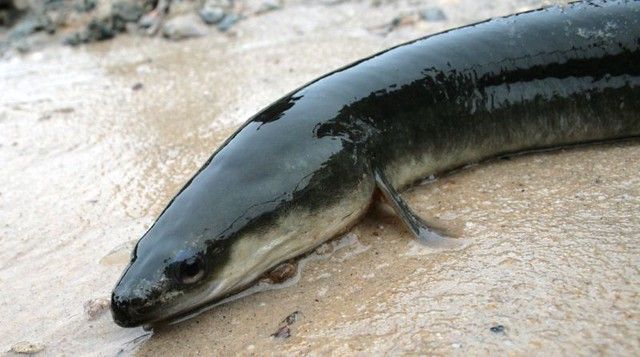
The American Eel belongs to the Anguillidae family. The size of the adult female can reach 1 m in length, while that of the male does not exceed 40 cm. Spawning takes place in mid-winter. Females lay 3 to 22 million eggs. He can live to be 50 years old. It can be fished from April to September. The American eel is a species of fish with a snake-like body all in length with fins that extend over its back, around its tail and along its inner surface. It has thick lips and a slightly longer lower jaw than her upper jaw, which gives her the appearance of having an overbite. The color of young eels varies from yellow-green or brown. Adult eels are grey with white or cream bellies.
The American Eel is a famous fish you can catch in Pollock.The Smallmouth bass
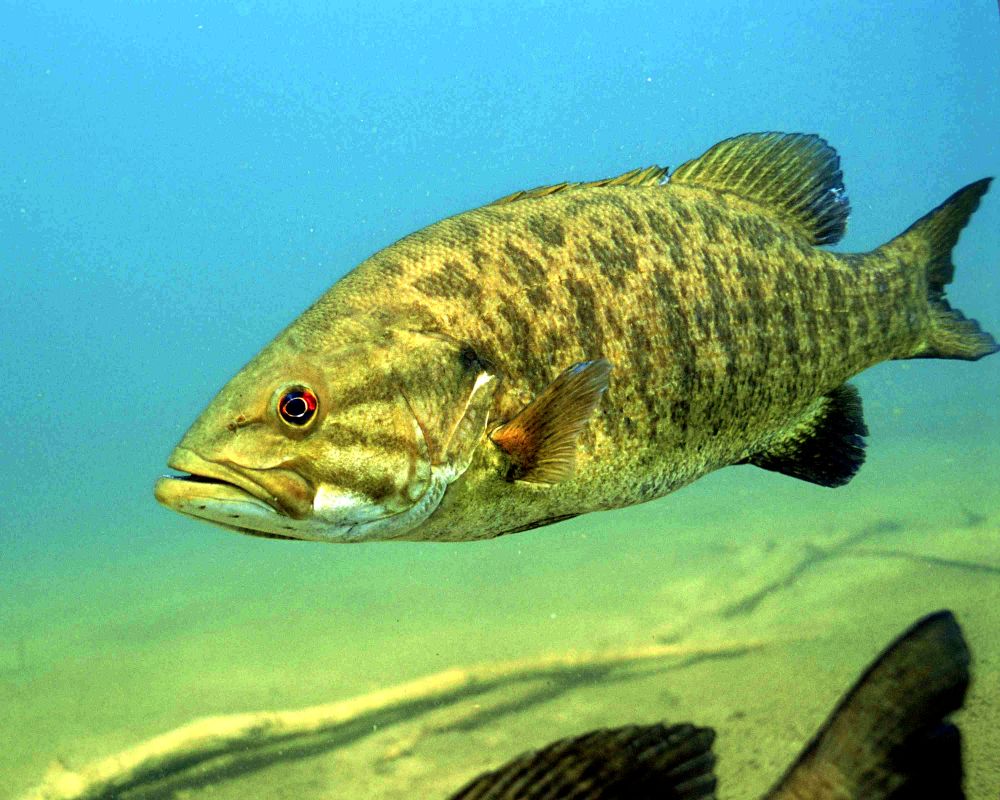
The Smallmouth bass belongs to the Centrarchidae family. The individuals observed measure between 20 and 38 cm. They weigh from 250 g to 1 kg. They can live up to 26 years. They reproduce from May to July. The best time to catch them is in autumn. Smallmouth bass is a fish with a strong body, compressed laterally. The head is broad and elongated. It is adorned with dark bars radiating backwards from the eyes. The back and top of the head are brown or golden brown, green or olive green. Contrary to its vernacular name, its mouth is rather large! Smallmouth bass has a long, rounded snout. The upper jaw does not extend beyond the upper edge of the eye. The anal fin has 3 strong spines. Both dorsal fins are slightly rounded and rather soft. They are linked and seem to form only one fin. The spines of the first dorsal fin are short and of almost the same length. The pelvic fins are joined by a membrane. The caudal fin is forked. The pectoral fins are transparent, all the others are opaque, dark or amber and decorated with black on the rays, spines or membranes. The back is darker and less golden than the sides. The flanks are marked with 8 to 15 thin vertical bars of dark appearance; this characteristic is more pronounced in juveniles. The belly of smallmouth bass is cream to milky in color. Body color varies according to size, but also according to its environment: in clear waters, it is dark and enhanced by pronounced contrasting marks, while in turbid waters, it is lighter and
The Smallmouth bass is a famous fish you can catch in Pollock.The Lahontan cutthroat trout
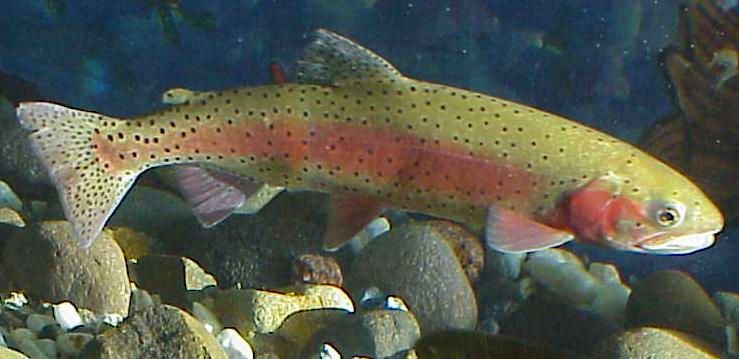
The Lahontan cutthroat trout belongs to the Salmonidae family. It can reach 1 m for 24 kg. It has a lifespan of less than 5 years. It breeds between February and July. The best time to catch it is between March and April. It is a quite large fish with a square tail to hunt prey and avoid predators. The coloring is green to greenish brown on the back, pale yellow with a pink lateral band on the sides and silver to white on the belly. Parr marks fade in mature fish. Spawning trout can be copper, red and orange, especially male. Large rounded spots, almost as black as ink, scatter little over the body, with less below the lateral line. Like other cutthroat trout, they have a distinct red to orange mark on their throats, but can be pale on lakes.
The Lahontan cutthroat trout is a famous fish you can catch in Pollock.The Atlantic salmon
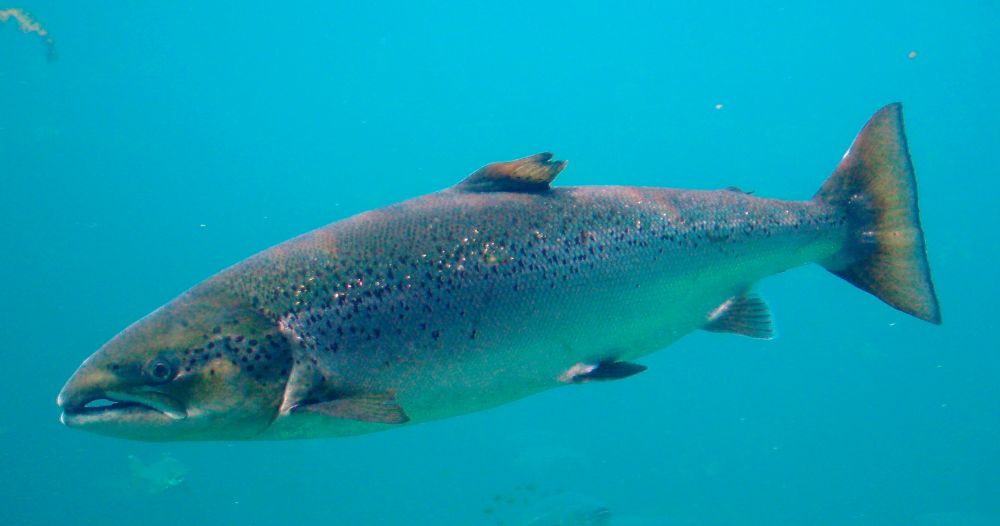
The Atlantic salmon belongs to the Salmonidae family. Atlantic salmon can measure up to 1.50 m in length and weigh up to 36 kg. The average longevity of Atlantic salmon is estimated at 10 years. It breeds from October to November. The female lays 1500 to 1800 eggs per kg of weight. It can be fished all year round. Atlantic salmon have an elongated and slender body. The anal fin has eight to eleven rays. The caudal is large, concave in adults and forked in young people. The head is small and flattened on top. The mouth is large (split to the posterior edge of the eye) and has strong teeth on the jaws, tongue and palate. The scales are large and visible. The lateral line is straight. Large black dots on a light background form X on the head, back and dorsal fin. The color varies from blue to blue-grey on the back, it is silvery on the sides. It varies during the spawning season, with adults turning bronze to dark brown. They lose their silvery livery when they enter fresh water. Males are marked with red dots on the sides. The young are marked with seven to eleven vertical fingerprints that they will lose when they enter the sea. As spawning approaches, the male's head will change: it will elongate, the lower jaw will develop and bend to form a hook (male "becard").
The Atlantic salmon is a famous fish you can catch in Pollock.The Steelhead Trout
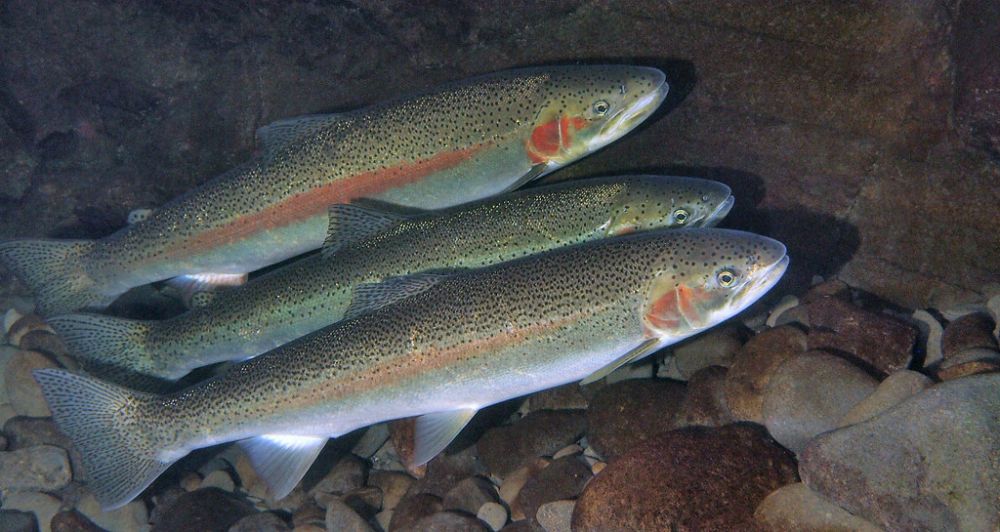
The Steelhead trout belongs to the Salmonidae family. Steelhead trout is a name given to the anadromous form of red-band trout (O. m. Gairdneri) or coastal rainbow trout (Oncorhynchus. M. irideus). Steelhead trout can weigh up to 26 kg and reach a length of 114 cm. He can live 11 years. It breeds from January to April. It is fished from the end of October to the month of November. Steelheads trout generally have a more refined shape and a silver or copper color when they reach adulthood, which is why they are called them.
The Steelhead Trout is a famous fish you can catch in Pollock.Our fishing forecast of Pollock indicates the best time to go fishing in this city.
Our fishing forecast of Pollock indicates the best time to go fishing in this city.
Our fishing forecast of Pollock indicates the best time to go fishing in this city.
